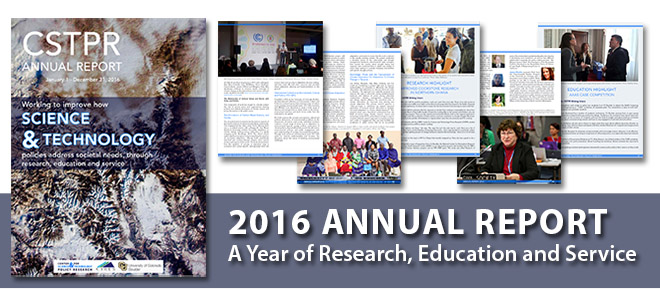
January 1 – December 31, 2016
Full Annual Report [pdf]
Working to improve how science & technology policies address societal needs through research, education and service
The Center for Science and Technology Policy Research (CSTPR) was established within CIRES in 2001 to conduct research, education, and outreach at the interface of science, technology, and the needs of decision makers in public and private settings. The Center’s vision is to serve as a resource for science and technology decision makers and those providing the education of future decision makers. Our mission is to improve how science and technology policies address societal needs, through research, education and service.
As 2017 begins, it is a great opportunity to reflect on our accomplishments and ongoing endeavors here in the Center for Science and Technology Policy Research (CSTPR). In these urgent and opportune times, CSTPR core faculty, staff, postdocs, graduate and undergraduate students have constructively addressed many pressing, dynamically changing and important science, technology, and policy issues before us. These efforts have further been invigorated by visitors we have hosted during 2016, who have contributed to furthering our CSTPR mission. Through research, teaching and service projects to improve our understandings of how the quality of decision-making can catalyze and enhance webs of interaction between science, technology, politics, policy and society, members of the CSTPR community have engaged in a range of activities that are outlined in the pages that follow here.
Collectively, we in CSTPR have identified four priority areas of engagement with our ongoing work:
- Science and Technology Policy: we forge ahead with analyses of decisions at the science-policy interface, including making public and private investments in science and technology, governing the usability of scientific information, and critically engaging the scientific and technical construction of emerging issues.
- Innovations in Governance and Sustainability: we continue to study innovations in governance and the complexity of sustainability challenges, including the development of new institutions that transcend conventional political boundaries or bring actors together in new ways, new tools and experimental interventions for inducing behavioral change or enabling participation in decision making, and new forms of association in the creation and protection of collective goods.
- Drivers of Risk Management Decisions: we move ahead with interrogations regarding how individuals and institutions – at local, regional, national, and international scales – make decisions to respond and adapt to perceived risks, and what factors promote or inhibit effective decision making.
- Communication and Societal Change: we press forward with experimentation and critical analyses of communication strategies and engagement in varying cultural, political and societal contexts.
You’ll spot imprints of these key themes among the highlights noted in this report, through our ongoing investment in the Science and Technology Policy graduate certificate program, the revamped Prometheus 2.0 blog, our brownbag seminar series, the American Association for the Advancement of Science Catalyzing Advocacy in Science and Engineering (AAAS CASE) workshop student competition, and the CU-Red Cross/Red Crescent Climate Centre internship program. These are just some of the many important commitments that we have made in 2016 that continue into this year and beyond.
From my vantage point as Director of CSTPR, I am very proud of our CSTPR efforts to develop, maintain and continue active collaborations so that scientific work finds traction in science-policy and public arenas at CU Boulder and beyond. I hope you will enjoy reading through this report and getting a sense of our accomplishments from 2016, and our activities going forward.
Max Boykoff, Director
Annual Report [pdf]

